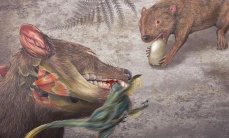Russian and South Korean scientists decipher genome of ancient animals
The DNA molecules of the cell nucleus has been taken from the bones of mammoths, bison, horses, rhinoceros, elk, deer, and wolf. The first results will be known in the summer of 2017.

YAKUTSK, December 21. /Offset. TASS Susanna Rozhina/. The genome of ancient animals for the first time in Russia will be decrypted by Russian and South Korean scientists. About this TASS said a leading researcher of the International centre for collective use of NEFU “Molecular paleontology” Lena Grigorieva.
“We’re in the lab “Molecular paleontology” in Yakutsk has already identified the DNA from the bones of ancient animals paleontology — this is the first phase of large-scale genome studies. Data is sent to South Korea in the biotechnology research Fund Sooam for carrying out transcripts, then in summer in Yakutsk will be carried out data interpretation and analysis. Prior to that, and no one in our country did not do a genome project paleontological animals,” she said.
Read takebayashi proved that the ancient Europeans ate rodents
DNA molecules out of the cell nucleus taken from the mammoth, bison, horses, rhinoceros, elk, deer, and wolf.
“DNA taken from the bones of animals where the safety is much higher than in the tissues. We used fresh paleontological findings that were discovered in this or last year. The data then is compared to modern animals,” said Grigoriev.
According to the scientist, the first results will be known in the summer of 2017.See also the Study: the Ancestors of kangaroos ate dinosaurs
the Study: the Ancestors of kangaroos ate dinosaurs
Representatives of International center for collective use of NEFU “Molecular paleontology” in March of 2017 for the first time will travel to China to conduct research in Beijing Institute of genomics DNA sequencing Malashevska mammoth.
“The world’s largest Institute for genetic analyses, and Chinese scientists will try to clone our mammoth,” said Grigoriev.
The carcass of a woolly mammoth were found on the island of Small Lyakhovsky Novosibirsk archipelago in the autumn of 2012. It has tried to clone South Korean scientists, but to no avail.